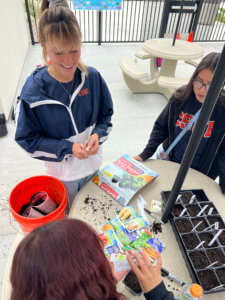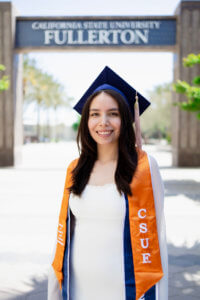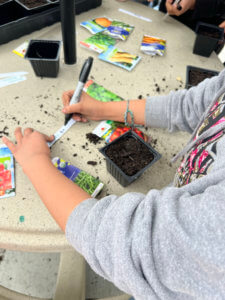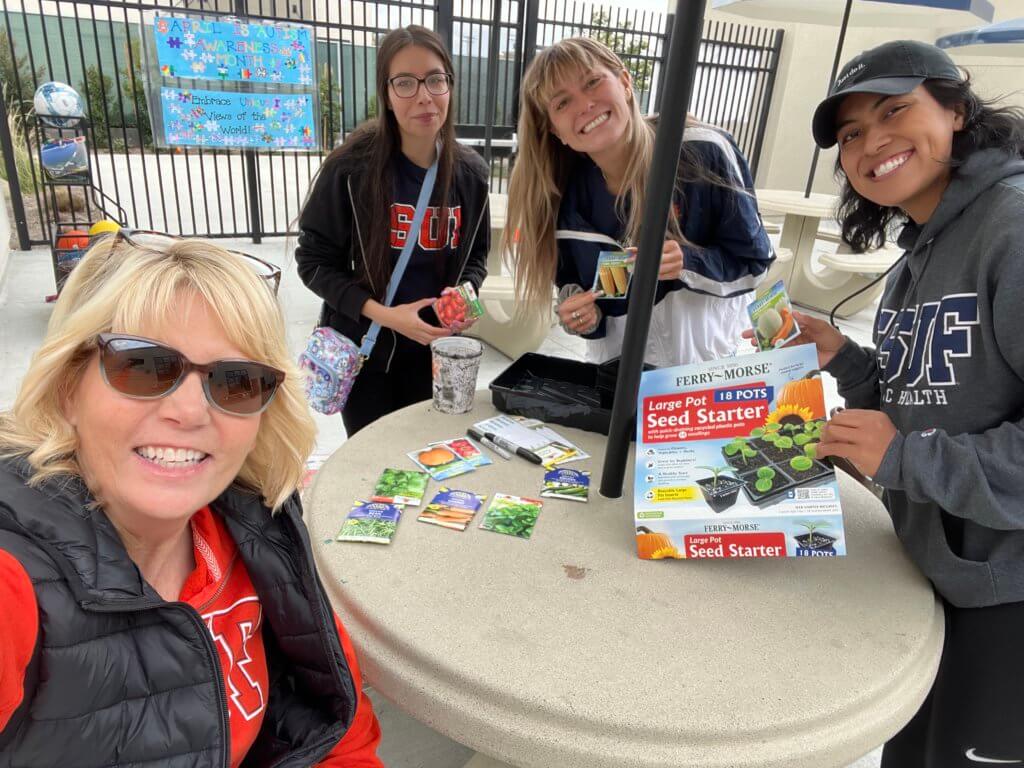
When Karissa Andert, a public health student at Cal State Fullerton, first came to Skyview School, she was interning in the elementary school’s pantry.
Interacting with students and stocking shelves with healthy food for kids to take home, Andert’s passion for nutrition, sustainability, and community-based health began to grow.
“Skyview School is a kindergarten through eighth grade system that serves children with family concerns,” said Laura Chandler, associate professor of public health and Andert’s mentor. he explained. “Carisa understood the needs of children and had a passion for working with children. During her internship, she collaborated with her administrator on how to improve children’s nutritional habits. We started talking.”

Inspired by her experience in the field, Andert joined Cal State Fullerton’s Nutrition Knowledge Initiative (LINK) to conduct research on the nutritional health and well-being of at-risk youth in Orange County. and developed a plan to address food insecurity in Orange County. Sky view.
Funded by a grant from the USDA National Institute of Food and Agriculture, this program teaches students about nutrition and chronic disease prevention in Latino communities while preparing them for careers in public health, health sciences, and kinesiology. I will teach you.
LINK scholars conduct research with faculty advisors, gain experience in the field, find solutions to public health problems, and intern at organizations such as the Orange County Health Department and Kaiser Permanente. said Lilia Espinoza, associate professor of science and co-investigator on the program.
Nutrition and physical activity habits of Orange County youth
Under the direction of Chandler, Andert, and Yelleni Tenorio ’23 (BS Public Health), we investigated the physical activity and nutritional habits of children experiencing family instability.
Previous research has found that less than 30% of students aged 6 to 17 meet the national recommendation of 60 minutes of physical activity a day. This can lead to childhood obesity and the development of mental illness, Tenorio explained. When Tenorio expanded her research on physical activity habits, particularly among young people from unstable family backgrounds, she discovered a gap in the existing literature.

“Having a child without a stable home significantly increases the risk of childhood obesity,” she explained.
Her research found that many students are inactive because they don’t have outdoor space or safe places to play when they’re at home. Those habits were replicated at school, where Tenorio noticed many children continued to sit on the sidelines during recess.
Interviewing teachers and surveying children, this ambitious public health researcher designed and implemented a physical activity plan for Skyview students in kindergarten through ninth grade. Tenorio said she sees a difference when she involves her students in games and obstacle courses, as they go from being afraid of physical activity to being willing to participate.
“They were very eager to be active,” Tenorio said. “We helped provide guidelines for students on how to continue to be active with their friends and school community.”
While Tenorio worked with children on the playground, Andert focused on how children fuel their bodies, and that children from low-income families are at higher risk of becoming obese. I discovered that.

Mr. Andert introduced students to the concept of gardens in the elementary school curriculum and fostered positive attitudes towards fruit and vegetable consumption through interactive and hands-on planting activities about nutrition and sustainable agriculture. .
“We created a culture of gardening in this school that didn’t exist before,” Andert said. “The children were so excited. Even now, when I go to school, they tell me about the plants they grew in pots.”
Inspired by her work with the LINK program, Andert said she plans to continue working with the district and the school’s garden planning committee next year to build a large campus garden at Skyview.
impact the community
As ambitious researchers interested in community health and well-being, Andert and Tenorio said one of the unique aspects of this program is to encourage students to apply their research to the communities they hope to serve. He said it was about providing opportunities.
“It’s like planting a seed. In the classroom, I learned about childhood obesity and its contributing factors, but by visiting schools, interacting with children, and seeing everything firsthand, I began to blossom as a researcher.” said Chandler.
Through their research, both students gained valuable research experience in the field, identifying gaps in existing literature, interviewing subjects, conducting surveys, and adapting plans that yielded positive results.

“They need to talk to administrators, present their findings, and convince others that this is a necessary change,” Chandler says. “There are a lot of hoops to jump through, and we are as committed as ever to the young, passionate people who will drive that change forward and continue to do this great work that is needed in our fields and communities.” We need inspirational people.”